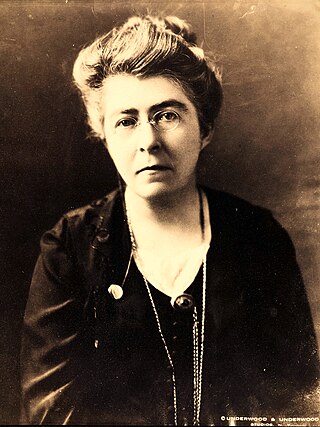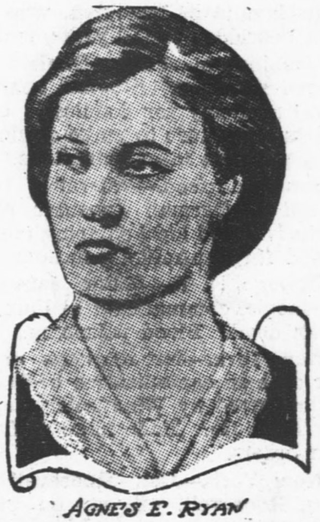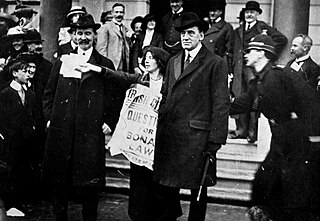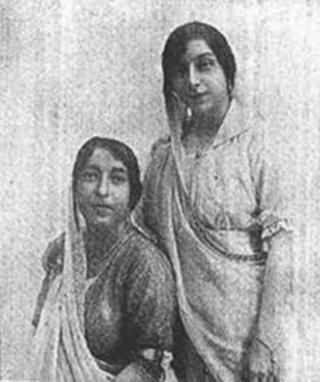
James Henry Cousins was an Irish-Indian writer, playwright, actor, critic, editor, teacher and poet. He used several pseudonyms, including Mac Oisín and the Hindu name Jayaram.

Johanna Mary Sheehy-Skeffington was a suffragette and Irish nationalist. Along with her husband Francis Sheehy-Skeffington, Margaret Cousins and James Cousins, she founded the Irish Women's Franchise League in 1908 with the aim of obtaining women's voting rights. She was later a founding member of the Irish Women Workers' Union. Her son Owen Sheehy-Skeffington became a politician and Irish senator.

The National Union of Women Suffrage Societies (NUWSS), also known as the suffragists was an organisation founded in 1897 of women's suffrage societies around the United Kingdom. In 1919 it was renamed the National Union of Societies for Equal Citizenship.

Rosa Frances Emily Swiney was an early British feminist, writer, and theosophist.

Charlotte Despard was an Anglo-Irish suffragist, socialist, pacifist, Sinn Féin activist, and novelist. She was a founding member of the Women's Freedom League, the Women's Peace Crusade, and the Irish Women's Franchise League, and an activist in a wide range of political organizations over the course of her life, including among others the Women's Social and Political Union, Humanitarian League, Labour Party, Cumann na mBan, and the Communist Party of Great Britain.
Louie Bennett was an Irish suffragette, trade unionist, journalist and writer. Born and raised in Dublin, she established the Irish Women's Suffrage Federation in 1911. She was a joint editor and contributor to the Irish Citizen newspaper. She wrote two books, The Proving of Priscilla (1902) and A Prisoner of His Word (1908), and continued to contribute to newspapers as a freelance journalist. She played a significant role in the Irish Women Workers' Union, and was the first woman president of the Irish Trade Union Congress.
Barbara Nelle Ramusack is a historian and Charles Phelps Taft Professor of History Emerita at the University of Cincinnati. Her focus was on Indian and Chinese History. She obtained her Ph.D in 1969 from the University of Michigan.

Margaret McCoubrey (1880–1955) was a Belfast-based Irish suffragist, pacifist, and an activist in the cooperative and labour movements. Standing for the Belfast Labour Party, she was elected to Belfast City Council in 1920..

The Irish Women's Franchise League was an organisation for women's suffrage which was set up in Dublin in November 1908. Its founder members included Hanna Sheehy-Skeffington, Margaret Cousins, Francis Sheehy-Skeffington and James H. Cousins. Thomas MacDonagh was a member.

Dame Kathleen D'Olier Courtney, DBE was a leader in the suffragist movement in the United Kingdom.

The All-Asian Women's Conference (AAWC) was a women's conference convened in Lahore in January 1931. It was the first pan-Asian women's conference of its kind. Dominated by Indian organizers, "the AAWC was a vehicle for Indian women to voice their ideas and vision of an Indian-centred Asia". Its predecessor, the All Indian Women's Conference (AIWC), aimed to examine areas of education and legislation to improve the position of women. Like the AIWC, the AAWC aimed to expand this agenda in order to include women in Asia's vision for independence.

Agnes Edna Ryan was an American pacifist, vegetarian, suffragist and managing editor of Woman's Journal, 1910-1917.

Meg Connery , was an Irish suffragist organiser and activist.

Lillian Margaret Metge was an Anglo-Irish suffragette and women's rights campaigner. She founded the Lisburn Suffrage Society, which she left to become a militant activist, leading on an explosion at the Anglican Lisburn Cathedral in Ireland. She was imprisoned briefly, and awarded a Women's Social and Political Union Hunger Strike medal. She continued her campaign, albeit peacefully, during and after World War I.

Herabai Tata (1879–1941) was an Indian women's rights activist and suffragist. Married in 1895, Tata's husband was progressive and supported the education of his wife and daughter, hiring tutors to help her with her schooling. In 1909, Tata, who was Parsi, developed an interest in Theosophy and within a few years made the acquaintance of Annie Besant. Around the same time, in 1911, she met Sophia Duleep Singh, a British suffragist with Indian heritage, who influenced her development as a suffragist. A founding member and the general secretary of the Women's Indian Association, she became one of the women who petitioned for enfranchisement before the Montagu-Chelmsford investigation in 1917.
The Women's suffrage movement in India fought for Indian women's right to political enfranchisement in Colonial India under British rule. Beyond suffrage, the movement was fighting for women's right to stand for and hold office during the colonial era. In 1918, when Britain granted limited suffrage to women property holders, the law did not apply to British citizens in other parts of the Empire. Despite petitions presented by women and men to the British commissions sent to evaluate Indian voting regulations, women's demands were ignored in the Montagu–Chelmsford Reforms. In 1919, impassioned pleas and reports indicating support for women to have the vote were presented by suffragists to the India Office and before the Joint Select Committee of the House of Lords and Commons, who were meeting to finalize the electoral regulation reforms of the Southborough Franchise Committee. Though they were not granted voting rights, nor the right to stand in elections, the Government of India Act 1919 allowed Provincial Councils to determine if women could vote, provided they met stringent property, income, or educational levels.

Lakshmibai Rajwade (1887–1984) was an Indian medical doctor, feminist, and family planning advocate. She was also a suffragist and advocate for the right of women to vote in India, and presided over the All India Women's Conference as well as acting as its secretary. She was the author of an influential report on the role of women in the Indian economy in 1938, as well as a driving force in the adoption of family planning measures as part of the agenda of the Indian independence movement. Rajwade also represented India internationally, at the United Nations and helped establish links between Indian women's organizations and international women's organizations.
Dorothy Jinarajadasa was an English feminist, suffragette, and writer based in India. Along with Margaret Cousins and Annie Besant, she established the Women's Indian Association in 1917, and was active in efforts to end child marriage and female illiteracy in India. She was a justice of the peace for Madras, and an active Theosophist. She is one of the earliest members of the suffragist movement in India, and is known for her efforts to build transnational networks between suffrage movements.













